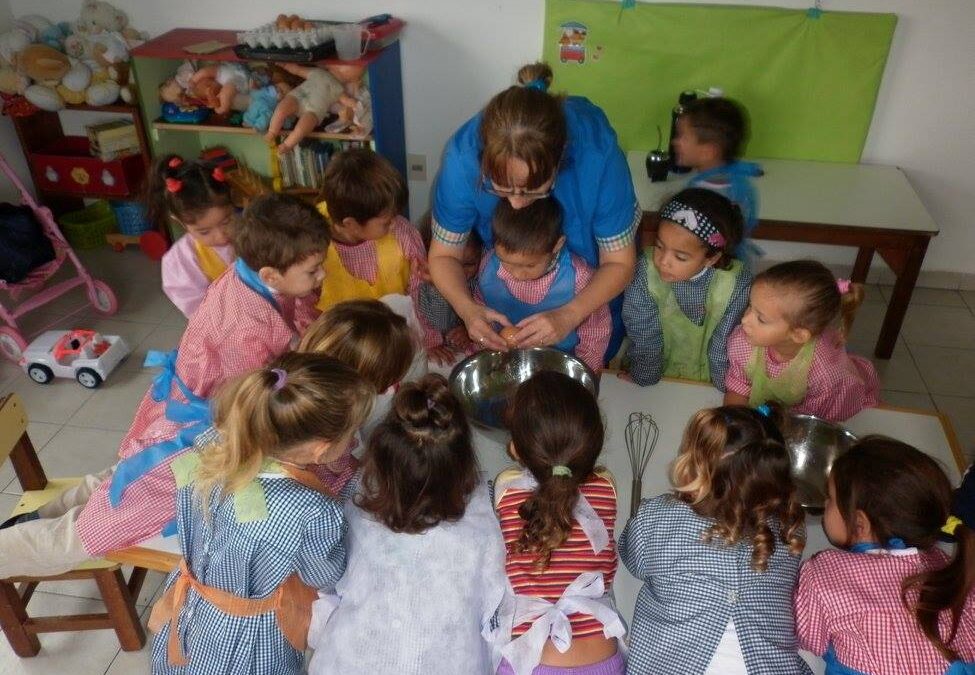
Sep 12, 2017 | Non categorizzato
 Thousands of young people are preparing for the Genfest by seizing opportunities to promote universal brotherhood across the globe. Not as noisy as the wars and bombings, less worth it for the crime channels, but factual and quite effective when it comes to building a world without barbed wire borders, hatred and indifference. It’s the MILONGA Project, not a place for dancing the tango, but an international volunteer programme that does have some similarities with the Latin American dance style known as tango: with its fast pace, its warmth and generous spirit. This communication network connects thousands of social projects around the world. It’s known as the MILONGA Project. MILONGA is an acronym formed by the Italian words for: a thousand non-governmental organizations in action (www.milongaproject.org) that are all inspired by the Focolare’s charism of unity. The young men and women who belong to the project not only volunteer, but also expand their hearts as they open themselves to the rich cultures of other countries. Promoted by the International New Humanity Association and by Youth for a United world, the MILONGA Project went through a pilot phase in Latin America (Argentina, Bolivia, Brazil, Mexico, Paraguay, Venezuela and Uruguay). Now, it is also active in Italy, Croatia Jordan, Philippines, Kenya and Tanzania.
Thousands of young people are preparing for the Genfest by seizing opportunities to promote universal brotherhood across the globe. Not as noisy as the wars and bombings, less worth it for the crime channels, but factual and quite effective when it comes to building a world without barbed wire borders, hatred and indifference. It’s the MILONGA Project, not a place for dancing the tango, but an international volunteer programme that does have some similarities with the Latin American dance style known as tango: with its fast pace, its warmth and generous spirit. This communication network connects thousands of social projects around the world. It’s known as the MILONGA Project. MILONGA is an acronym formed by the Italian words for: a thousand non-governmental organizations in action (www.milongaproject.org) that are all inspired by the Focolare’s charism of unity. The young men and women who belong to the project not only volunteer, but also expand their hearts as they open themselves to the rich cultures of other countries. Promoted by the International New Humanity Association and by Youth for a United world, the MILONGA Project went through a pilot phase in Latin America (Argentina, Bolivia, Brazil, Mexico, Paraguay, Venezuela and Uruguay). Now, it is also active in Italy, Croatia Jordan, Philippines, Kenya and Tanzania. 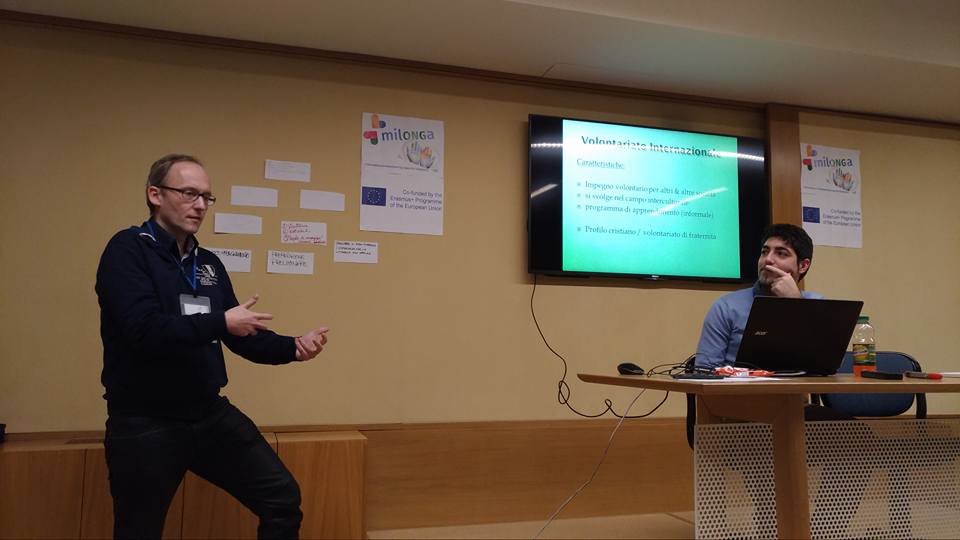 On August 5th, representatives from the Focolare’s permanent Mariapolises around the world, and representatives from various NGOs, met for one week at the Mariapolis in Brazil to discuss strategies for further network development, examining strategic and management aspects of the program, selection and accompaniment, monitoring and reception of participants into the project; and also to offer a quality formation process that will have a positive impact on both the individual volunteers and on the host communities. Sixty young people who participated in the pilot projects will now have the opportunity to fulfil their dream of volunteering beyond their own borders. MILONGA provides training in preparation for the arrival in the host country, with an indvidualized training program for each volunteer, as well as for the host entity in the other country. It provides a trainer that accompanies the young person through every phase of the experience – training, stay and return to one’s own country. It also ensures that the young person will be welcomed by the local Mariapolis and Focolare community and have a direct experience of the local environment. Each participant has an opportunity to interact with peers on an international level by linking up with the United World Project.
On August 5th, representatives from the Focolare’s permanent Mariapolises around the world, and representatives from various NGOs, met for one week at the Mariapolis in Brazil to discuss strategies for further network development, examining strategic and management aspects of the program, selection and accompaniment, monitoring and reception of participants into the project; and also to offer a quality formation process that will have a positive impact on both the individual volunteers and on the host communities. Sixty young people who participated in the pilot projects will now have the opportunity to fulfil their dream of volunteering beyond their own borders. MILONGA provides training in preparation for the arrival in the host country, with an indvidualized training program for each volunteer, as well as for the host entity in the other country. It provides a trainer that accompanies the young person through every phase of the experience – training, stay and return to one’s own country. It also ensures that the young person will be welcomed by the local Mariapolis and Focolare community and have a direct experience of the local environment. Each participant has an opportunity to interact with peers on an international level by linking up with the United World Project. 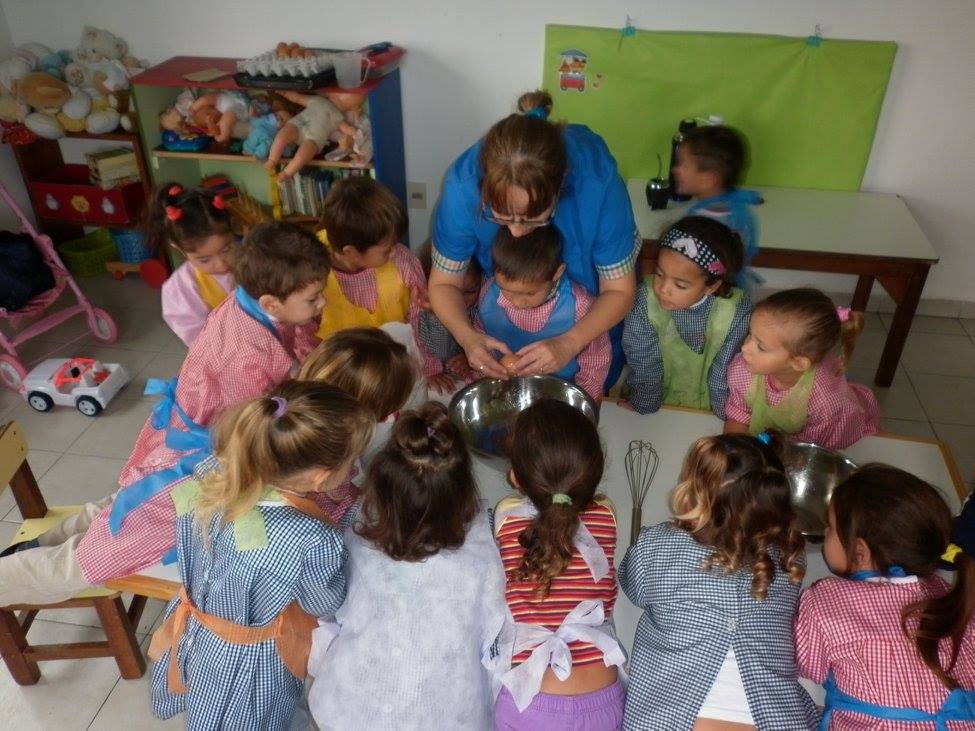 MILONGA’s method emerges from an experience that has matured over years, and from the impact that the volunteer experience is having in a variety of settings. It is a rather unique style of social action, in which the fraternal bond among the different actors is the main key. Fraternity is also the key in motivating the encounter of the different communities in vulnerable situations, to bring about an experience of communion with the volunteers, and experience of dialogue and real intercultural exchange, in order to discover together solutions that do not come from above, but are as much as possible shared in a reciprocal way. “It’s not so easy to put into a few words what I experienced for a month at the Casa de los Niños (Children’s Home) in Cochabamba,” says an Uruguayan volunteer at an NGO in Bolivia. “After New Year’s I was headed for an adventure that I had been thinking about for some time, saving money and getting my heart ready. I wanted to go with an NGO that had the Focolare spirit, and I was surprised by the brotherhood I experienced throughout every moment.” “I got to know a social reality that is very different from the one we live,” says a young Spanish volunteer, “a very powerful reality that helped me, not so much to be aware of certain problems, because perhaps I already had some knowledge of them, but to recognize and accept the fact that beyond where we come from, how much money we have, where we live – we’re all equal and the same.”
MILONGA’s method emerges from an experience that has matured over years, and from the impact that the volunteer experience is having in a variety of settings. It is a rather unique style of social action, in which the fraternal bond among the different actors is the main key. Fraternity is also the key in motivating the encounter of the different communities in vulnerable situations, to bring about an experience of communion with the volunteers, and experience of dialogue and real intercultural exchange, in order to discover together solutions that do not come from above, but are as much as possible shared in a reciprocal way. “It’s not so easy to put into a few words what I experienced for a month at the Casa de los Niños (Children’s Home) in Cochabamba,” says an Uruguayan volunteer at an NGO in Bolivia. “After New Year’s I was headed for an adventure that I had been thinking about for some time, saving money and getting my heart ready. I wanted to go with an NGO that had the Focolare spirit, and I was surprised by the brotherhood I experienced throughout every moment.” “I got to know a social reality that is very different from the one we live,” says a young Spanish volunteer, “a very powerful reality that helped me, not so much to be aware of certain problems, because perhaps I already had some knowledge of them, but to recognize and accept the fact that beyond where we come from, how much money we have, where we live – we’re all equal and the same.”
Sep 11, 2017 | Focolare Worldwide
After Hurricane Irma’s passage over the Caribbean where it caused death and destruction, the violent storm hit Florida, which has been declared in a state of emergency. More than 5.8 million people have been left without electricity, running water or internet. Five deaths have been confirmed. It has now weakened to a category 1 hurricane, with 136 kilometer winds, and is now heading towards Atlanta, Georgia. The local Focolare community writes: “We’re in constant contact with our community in Florida. Many have had to leave their homes and find safe places to stay. They tell us that they are trying to help people who are all alone, neighbors and parents and relatives living outside the country, and the same goes for the communities on the islands. The weakening hurricane is expected to arrive in Atlanta on Monday or Tuesday with a lot of rain and strong wind. We are seeing God’s love in all of this and experiencing how much we’re all brothers and sisters, thanks to this crisis. We’re finding that we can help each other, beyond the social divisions that are quite secondary now.”
Sep 11, 2017 | Non categorizzato
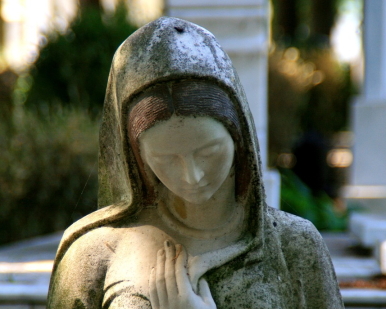
Sep 9, 2017 | Non categorizzato
 Mary’s children interpret her in many ways, all of them beautiful, but her most sumptuous beauty can be found in the singular position she holds among women. Hers is a name that we will never finish saying, a name that will continue to fill us with happiness every time we hear it. In the Angelic Salutation that has flown through history as a source of gladness, millions upon millions have greeted her in the same manner. With every Hail Mary all of us go back to that familiar salute, in the hope of obtaining her intercession in this human experiment called life, which culminates in death, the threshold of the everlasting life. “Mary!” Just saying her name makes our heart jump for joy, like the child in Elizabeth’s womb – “and Elizabeth was filled with the Holy Spirit.” “Mary!” This is what shepherds and carpenters said as they came to the door of that semblance of a stall, which was the home of the Holy Family on the Nazareth hillside. “Mary” they called her, as they went on to ask a favour, because she was always willing to serve anyone and full of possibilities for everyone. And if they didn’t have favours to ask, they would show up simply because of the pleasure it gave them to greet her with that name, which was filled with beauty and wonder because it summarized all the mysteries of love. “Mary”, the feminine word for Love… Like Archangel Gabriel, Joseph, the saints, and many sinners, we continue centuries later to call her by that same name, fifty, a hundred, or more times a day. We never pin on to it noble titles, high-sounding appellatives, primacy or rank. We prefer – as she prefers – to draw her closer to us and to never draw far from her, so that we can draw near to the Spouse who shares a singular unity with her. The rush of the crowds, whirlwind of the passions and traces of the Spirit that vein human history are filled with that name, through which love travels from the depths of the earth to heights of Heaven. Humility draws closer, and love unites: this is the great tribute. We feel at home in Christ’s Church, we feel at home in the Communion of Saints in the orbit of the Trinity: because Mary is there. The Mother is there, and so the children can come in. Wherever there is Mary, there is love. Wherever there is love, there is God. Just to say the name of Mary in whatever place or circumstance, is to step into a divine atmosphere in a single breath, to light a star in the middle of the night, to unlock the healing flow of poetry in the midst of a technological plague, to make a swamp blossom with lilies. To say Mary is to restore the warmth of a family to a world that seems to have become a forced labour camp. Mary loves and hides herself in love: Real love is contemplation of the beloved. Also in this, by imitating the young woman from Nazareth, we can be contemplatives in the midst of the world, in the hovel of a country farm house or in the apartment of a city dwelling. The love in Mary was so great that she provided God to us – God who is Love. She all but ripped him from Heaven in order to give him to earth. She made the Holy One one of us, a man at the service of all. Truly, love means making yourself one with the Beloved. Mary became so one with God that he gave himself over to her so that, through her, he would give himself to all people. Ultimately, you are in the world, in a different time and place, but, being there like Mary, you are always and everywhere preparing the place for Jesus to stay. (Igino Giordani, Maria modello perfetto, (Rome: Città Nuova, 2012), 17-20.
Mary’s children interpret her in many ways, all of them beautiful, but her most sumptuous beauty can be found in the singular position she holds among women. Hers is a name that we will never finish saying, a name that will continue to fill us with happiness every time we hear it. In the Angelic Salutation that has flown through history as a source of gladness, millions upon millions have greeted her in the same manner. With every Hail Mary all of us go back to that familiar salute, in the hope of obtaining her intercession in this human experiment called life, which culminates in death, the threshold of the everlasting life. “Mary!” Just saying her name makes our heart jump for joy, like the child in Elizabeth’s womb – “and Elizabeth was filled with the Holy Spirit.” “Mary!” This is what shepherds and carpenters said as they came to the door of that semblance of a stall, which was the home of the Holy Family on the Nazareth hillside. “Mary” they called her, as they went on to ask a favour, because she was always willing to serve anyone and full of possibilities for everyone. And if they didn’t have favours to ask, they would show up simply because of the pleasure it gave them to greet her with that name, which was filled with beauty and wonder because it summarized all the mysteries of love. “Mary”, the feminine word for Love… Like Archangel Gabriel, Joseph, the saints, and many sinners, we continue centuries later to call her by that same name, fifty, a hundred, or more times a day. We never pin on to it noble titles, high-sounding appellatives, primacy or rank. We prefer – as she prefers – to draw her closer to us and to never draw far from her, so that we can draw near to the Spouse who shares a singular unity with her. The rush of the crowds, whirlwind of the passions and traces of the Spirit that vein human history are filled with that name, through which love travels from the depths of the earth to heights of Heaven. Humility draws closer, and love unites: this is the great tribute. We feel at home in Christ’s Church, we feel at home in the Communion of Saints in the orbit of the Trinity: because Mary is there. The Mother is there, and so the children can come in. Wherever there is Mary, there is love. Wherever there is love, there is God. Just to say the name of Mary in whatever place or circumstance, is to step into a divine atmosphere in a single breath, to light a star in the middle of the night, to unlock the healing flow of poetry in the midst of a technological plague, to make a swamp blossom with lilies. To say Mary is to restore the warmth of a family to a world that seems to have become a forced labour camp. Mary loves and hides herself in love: Real love is contemplation of the beloved. Also in this, by imitating the young woman from Nazareth, we can be contemplatives in the midst of the world, in the hovel of a country farm house or in the apartment of a city dwelling. The love in Mary was so great that she provided God to us – God who is Love. She all but ripped him from Heaven in order to give him to earth. She made the Holy One one of us, a man at the service of all. Truly, love means making yourself one with the Beloved. Mary became so one with God that he gave himself over to her so that, through her, he would give himself to all people. Ultimately, you are in the world, in a different time and place, but, being there like Mary, you are always and everywhere preparing the place for Jesus to stay. (Igino Giordani, Maria modello perfetto, (Rome: Città Nuova, 2012), 17-20.
Sep 8, 2017 | Focolare Worldwide
Mexico has often been struck by seismic movements because it lies in a region where 5 tectonic plaques meet. But the earthquake which hit the nation on September 8 has been so far the most violent earthquake ever recorded (8.2 on the Richter scale). With the epicenter off the west coast, on the border with Guatemala, the earthquake was felt even as far as Mexico City. Much of the capital has remained without electricity and many people abandoned their houses going out into the dark streets. At least 15 have been found dead, although “the toll estimate is set to rise,” said President Enrique Peña Nieto. Oaxaca is the State which has been most hit. The Mexican bishops write: “God strengthens us as brothers and sisters in the faith, mobilising us towards those who have suffered because of this earthquake.” In Guatemala, one victim has been recorded.
Sep 8, 2017 | Non categorizzato
Gen Verde’s contribution to the historical celebration.
We were truly delighted to receive an invitation to perform at the Jubilee of the Reformation celebration in Stadthagen. Here we come with our concert On the Other Side!
It also has given us the opportunity to return to Germany after many years. In the month of September we will be in Boppard with our Upfront and Unplugged acoustic concert. And in Dortmund, Duderstadt and Mannheim with our Start Now Project. These are all opportunities to meet many people and to invite them to be protagonists all together in showing how we can look at the world from “the Other Side”: the side of those who believe in and live for unity. And to all the others: follow us at http://www.genverde.it/tours/
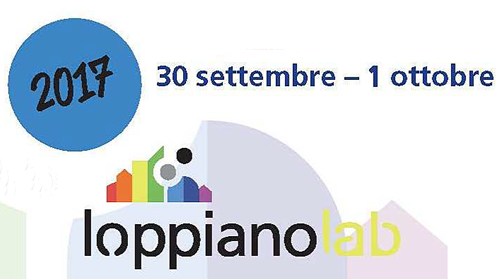
Sep 8, 2017 | Focolare Worldwide, Senza categoria
 The national workshop on economy, culture, communication, education and innovation is annually promoted by New City, Polo Lionello Bonfanti, Sophia University Institute, and the town of Loppiano which is hosting the event. In response to Pope Francis’s invitation, the aim of the convention is to offer the occasion for dialogue and proposals on the foremost issues in our country: from immigration to work, poverty to social inclusion, and battles against corruption to commitment for the common good, family, youth, education and many more. The convention will expound receptiveness to counter exclusion and the quest for private interest, promote new civic virtues to find solutions to the contradictions of our time, and act on the unjust structures that produce – precisely – “victims and bandits.” LoppianoLab is thus a cultural laboratory where the seeds of a new mentality will subsequently be sown, in the conviction that the pursuit of profit cannot be the compass for every human activity. The event is open to all those who question themselves on these themes and wish to become “artisans of change.” For information write to: loppianolab.accoglienza@loppiano.it
The national workshop on economy, culture, communication, education and innovation is annually promoted by New City, Polo Lionello Bonfanti, Sophia University Institute, and the town of Loppiano which is hosting the event. In response to Pope Francis’s invitation, the aim of the convention is to offer the occasion for dialogue and proposals on the foremost issues in our country: from immigration to work, poverty to social inclusion, and battles against corruption to commitment for the common good, family, youth, education and many more. The convention will expound receptiveness to counter exclusion and the quest for private interest, promote new civic virtues to find solutions to the contradictions of our time, and act on the unjust structures that produce – precisely – “victims and bandits.” LoppianoLab is thus a cultural laboratory where the seeds of a new mentality will subsequently be sown, in the conviction that the pursuit of profit cannot be the compass for every human activity. The event is open to all those who question themselves on these themes and wish to become “artisans of change.” For information write to: loppianolab.accoglienza@loppiano.it
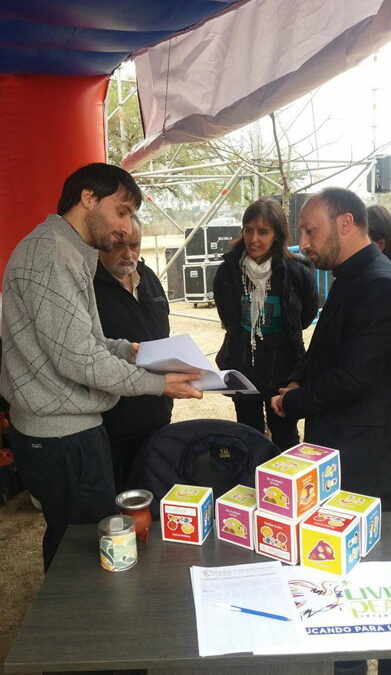
Sep 7, 2017 | Focolare Worldwide
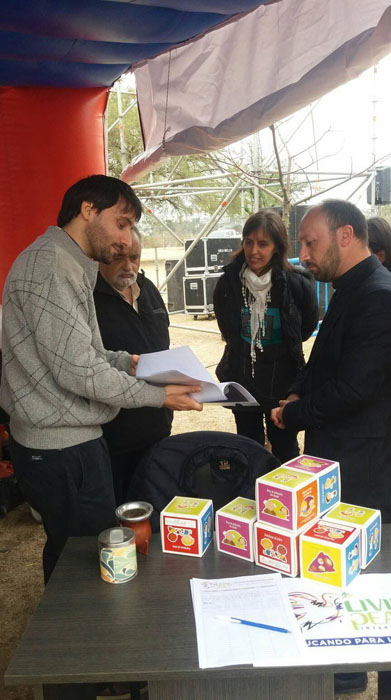 The Park of the Nations in Córdoba, Argentina, is always filled with children and teenagers on the “Día del Niño” (Day of the Child), which is celebrated on the third Sunday of August. The Park is the perfect place to hold games, tournaments and take walks. This year a festive crowd drew the attention of the passers-by, with the unveiling of a particularly meaningful monument: the Cube of Peace. There were games, obstacle courses, music and food just before the official unveiling in the presence of representatives from the Interreligious Commitee For Peace (COMIPAZ), members of the Armenian Church, the Jewish, Muslim and Evangelical communities. Fernanda Otero, Francisco Drab and Amelia Milagros López Loforte represented the Focolare community. The unveiling concluded with some words from Auxiliary Bishop Ricardo Seirutti who blessed the monument. It was to refrain from spinning the Cube. Each side displayed a sentence which, in spite of the rather playful and carefree atmosphere, were expected to be put into practice with seriousness and effort – and perhaps a bit of fatigue. The Cube proposes six actions that can be lived every day, each of them an expression of the Golden Rule,a version of which can be found in all religions: “Do to others what you would have them do to you:” Love everyone. Be the first to love. Love your enemy. Forgive. These are concrete gestures for a life that is counter current and courageous for the building of a more empathetic and supportive society. The unveiling was not an isolated event, but the result of many months of interaction and field work, duing which the Focolare youth took the Cube to several quarters in the city, as an educational tool for teaching peace through play and theatre. In neighbourhoods on the peripheries of Ciudad Evita, San Roque, Cabildo, Müller, Argüello where people live amidst violence, with their civil rights often violated and with the children of the Sierra Dorada Foundation in San Marcos Sierras, they worked side by side with local communities and organisations who are desirous of becoming more aware of local problems and taking direct action in favour of more incisive and effective social training. The project, sustained by the Focolare Movement, the organization for the defense of the rights of children and teenagers from the Province of Córdoba, the Living Peace Programme and the Interreligious Comittee for Peace, along with other organizations and public and private entities, aims to spread peace in all parts of society, beginning with a set of best practices for working with children, but valid for adults and in all environments. Similar activities are spreading in many other countries: Italy, Spain, Egypt, Hungary and Brazil where the now famous Cube has become the protagonist of a vast variety of educational projects and seminars. In Argentina, another Cube of Peace has been placed in a public area in Concepción, in the Province of Tucumán. Still in Córdoba, three days ealier, the Cube project was declared a cultural interest by the City Council. A small monument that continually comes to life.
The Park of the Nations in Córdoba, Argentina, is always filled with children and teenagers on the “Día del Niño” (Day of the Child), which is celebrated on the third Sunday of August. The Park is the perfect place to hold games, tournaments and take walks. This year a festive crowd drew the attention of the passers-by, with the unveiling of a particularly meaningful monument: the Cube of Peace. There were games, obstacle courses, music and food just before the official unveiling in the presence of representatives from the Interreligious Commitee For Peace (COMIPAZ), members of the Armenian Church, the Jewish, Muslim and Evangelical communities. Fernanda Otero, Francisco Drab and Amelia Milagros López Loforte represented the Focolare community. The unveiling concluded with some words from Auxiliary Bishop Ricardo Seirutti who blessed the monument. It was to refrain from spinning the Cube. Each side displayed a sentence which, in spite of the rather playful and carefree atmosphere, were expected to be put into practice with seriousness and effort – and perhaps a bit of fatigue. The Cube proposes six actions that can be lived every day, each of them an expression of the Golden Rule,a version of which can be found in all religions: “Do to others what you would have them do to you:” Love everyone. Be the first to love. Love your enemy. Forgive. These are concrete gestures for a life that is counter current and courageous for the building of a more empathetic and supportive society. The unveiling was not an isolated event, but the result of many months of interaction and field work, duing which the Focolare youth took the Cube to several quarters in the city, as an educational tool for teaching peace through play and theatre. In neighbourhoods on the peripheries of Ciudad Evita, San Roque, Cabildo, Müller, Argüello where people live amidst violence, with their civil rights often violated and with the children of the Sierra Dorada Foundation in San Marcos Sierras, they worked side by side with local communities and organisations who are desirous of becoming more aware of local problems and taking direct action in favour of more incisive and effective social training. The project, sustained by the Focolare Movement, the organization for the defense of the rights of children and teenagers from the Province of Córdoba, the Living Peace Programme and the Interreligious Comittee for Peace, along with other organizations and public and private entities, aims to spread peace in all parts of society, beginning with a set of best practices for working with children, but valid for adults and in all environments. Similar activities are spreading in many other countries: Italy, Spain, Egypt, Hungary and Brazil where the now famous Cube has become the protagonist of a vast variety of educational projects and seminars. In Argentina, another Cube of Peace has been placed in a public area in Concepción, in the Province of Tucumán. Still in Córdoba, three days ealier, the Cube project was declared a cultural interest by the City Council. A small monument that continually comes to life.
Sep 7, 2017 | Non categorizzato
The multi-religious marathon, “Rome Half Marathon Via Pacis,” will start off on Sunday 17 September from St. Peter’s Square to promote peace, integration and inclusion. Promoted by the Rome Capital and the Pontifical Council for Culture, Ministry of the Holy See, in partnership with FIDAL (Italian Track and Field Federation) and with the sponsorship of the CONI and CIP, the event is open to all, to say “stop violence, racism, and discrimination of any type and origin.” There will be two race routes (21 and 5 km), with five legs (St. Peter’s Basilica, Synagogue, Mosque, Valdes Church and Orthodox Church) to underline the participation of various confessions and religious communities. Also Sportmeet, the world network of sportsmen and women, operators and professionals of the Focolare Movement’s sports world will be attending as a sole team: “Sportmeet for a United World.” Those who wish to participate with Sportmeet may write to: info@sportmeet.org (also for the possible stay in Rome).
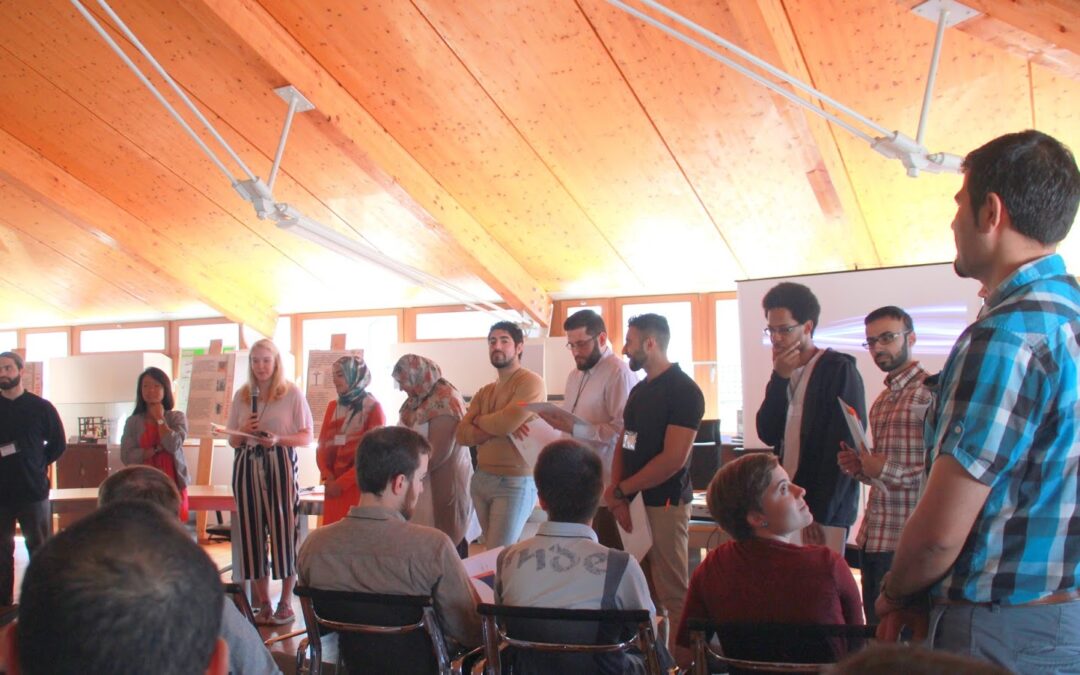
Sep 6, 2017 | Senza categoria
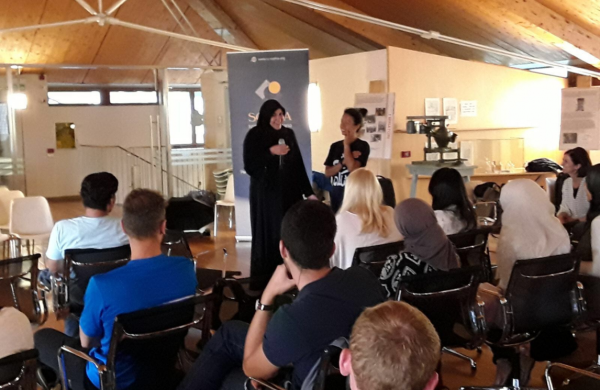 A summer school in the Primiero Valleys (Italy) is not a novelty. Some had taken place in the past years, thanks to the initiative of the Sophia University Institute. This year’s summer school held from 25 – 30 August had a precise interreligious profile, with the presence of Shiite and Christian students. Apart from the initiative’s success, this was not an occasional event, but a 20-year friendship journey undertaken by Shiite Muslims and Catholics, within the context of the Focolare Movement’s spirituality of communion. During the second half of the 1990s, Professor Mohammad Shomali with his wife, Mahnaz, also an academic from Qom (the holy city of Shi’a Islam in Iran), were both studying in England. Along with their studies they had hoped to find a way of establishing a relationship with dynamic Christian communities. Already at that time both had felt the calling to interreligious commitment. It was in this context that the two young academics met the Focolare Movement, and a deep spiritual friendship was established, based on the central point of love as a path to reach God and the brothers and sisters around us.
A summer school in the Primiero Valleys (Italy) is not a novelty. Some had taken place in the past years, thanks to the initiative of the Sophia University Institute. This year’s summer school held from 25 – 30 August had a precise interreligious profile, with the presence of Shiite and Christian students. Apart from the initiative’s success, this was not an occasional event, but a 20-year friendship journey undertaken by Shiite Muslims and Catholics, within the context of the Focolare Movement’s spirituality of communion. During the second half of the 1990s, Professor Mohammad Shomali with his wife, Mahnaz, also an academic from Qom (the holy city of Shi’a Islam in Iran), were both studying in England. Along with their studies they had hoped to find a way of establishing a relationship with dynamic Christian communities. Already at that time both had felt the calling to interreligious commitment. It was in this context that the two young academics met the Focolare Movement, and a deep spiritual friendship was established, based on the central point of love as a path to reach God and the brothers and sisters around us. 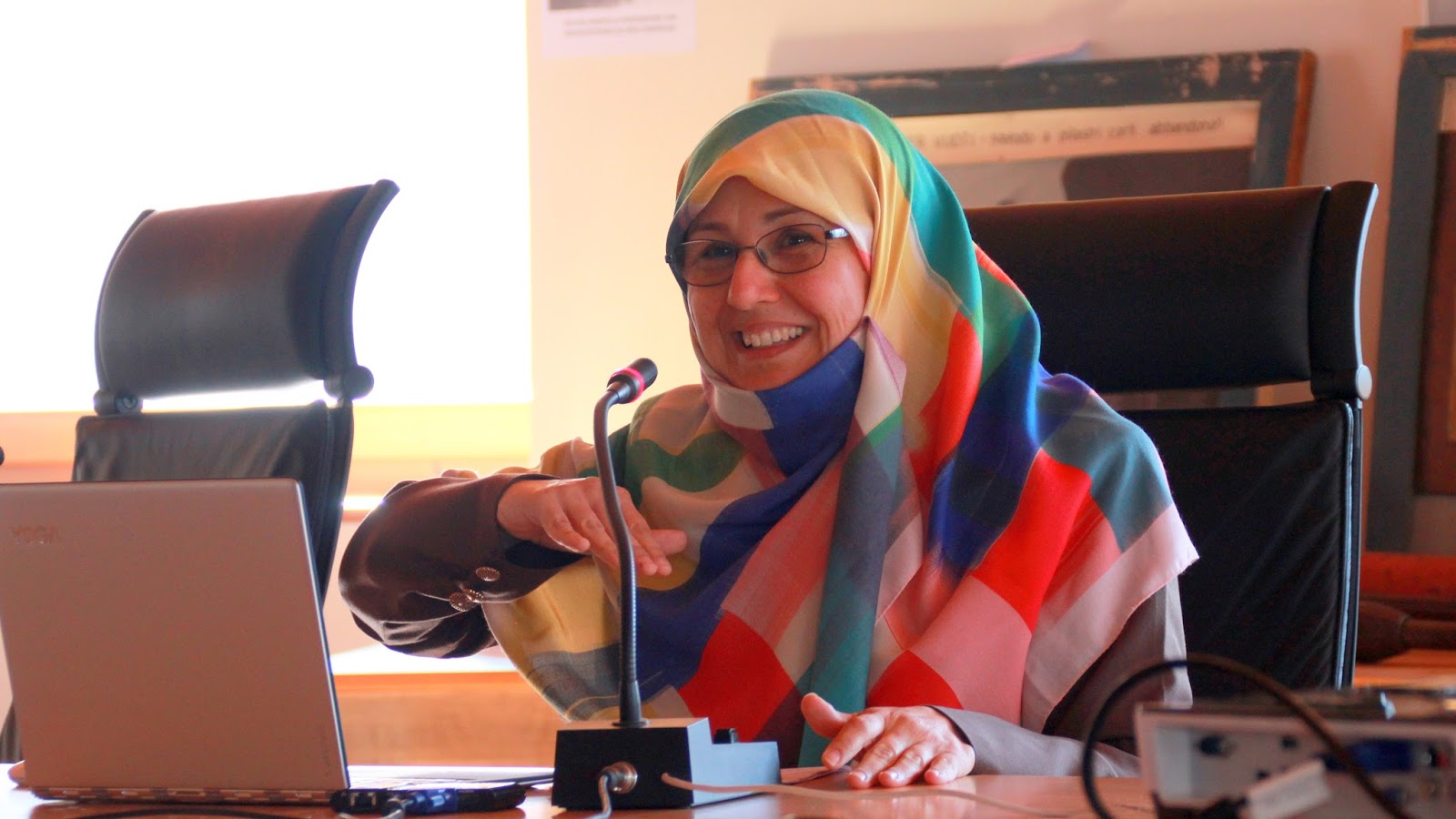 Besides a profound experience with the Benedictine community of the monastery of Ampleforth, the Shomalis had deepened their knowledge of the spirituality of communion and had also met other Christians and Muslims, on the occasion of international meetings held in Rome and in the town of Loppiano. After their return to Qom the relationships with the Focolare continued, and starting 2010 were enriched by academic values. In fact, to enhance a true bond between Shiite students of Qom and the Catholic Church, the Shomalis organised various group journeys to Italy, where they held meetings with the Pontifical Council for Interreligious Dialogue, the St. Anselm University, PISAI (Pontifical Institute for Arabic and Islamic Studies), and the Focolare Movement. In 2014, a delegation of the Movement’s Interreligious Dialogue Centre spent a week in Qom to meet various academic and religious groups and establish relationships of trust and communion at both concrete and intellectual levels, going deeper into the religious Christian heritage and highlighting common values and possibilities to set up paths of dialogue.
Besides a profound experience with the Benedictine community of the monastery of Ampleforth, the Shomalis had deepened their knowledge of the spirituality of communion and had also met other Christians and Muslims, on the occasion of international meetings held in Rome and in the town of Loppiano. After their return to Qom the relationships with the Focolare continued, and starting 2010 were enriched by academic values. In fact, to enhance a true bond between Shiite students of Qom and the Catholic Church, the Shomalis organised various group journeys to Italy, where they held meetings with the Pontifical Council for Interreligious Dialogue, the St. Anselm University, PISAI (Pontifical Institute for Arabic and Islamic Studies), and the Focolare Movement. In 2014, a delegation of the Movement’s Interreligious Dialogue Centre spent a week in Qom to meet various academic and religious groups and establish relationships of trust and communion at both concrete and intellectual levels, going deeper into the religious Christian heritage and highlighting common values and possibilities to set up paths of dialogue. 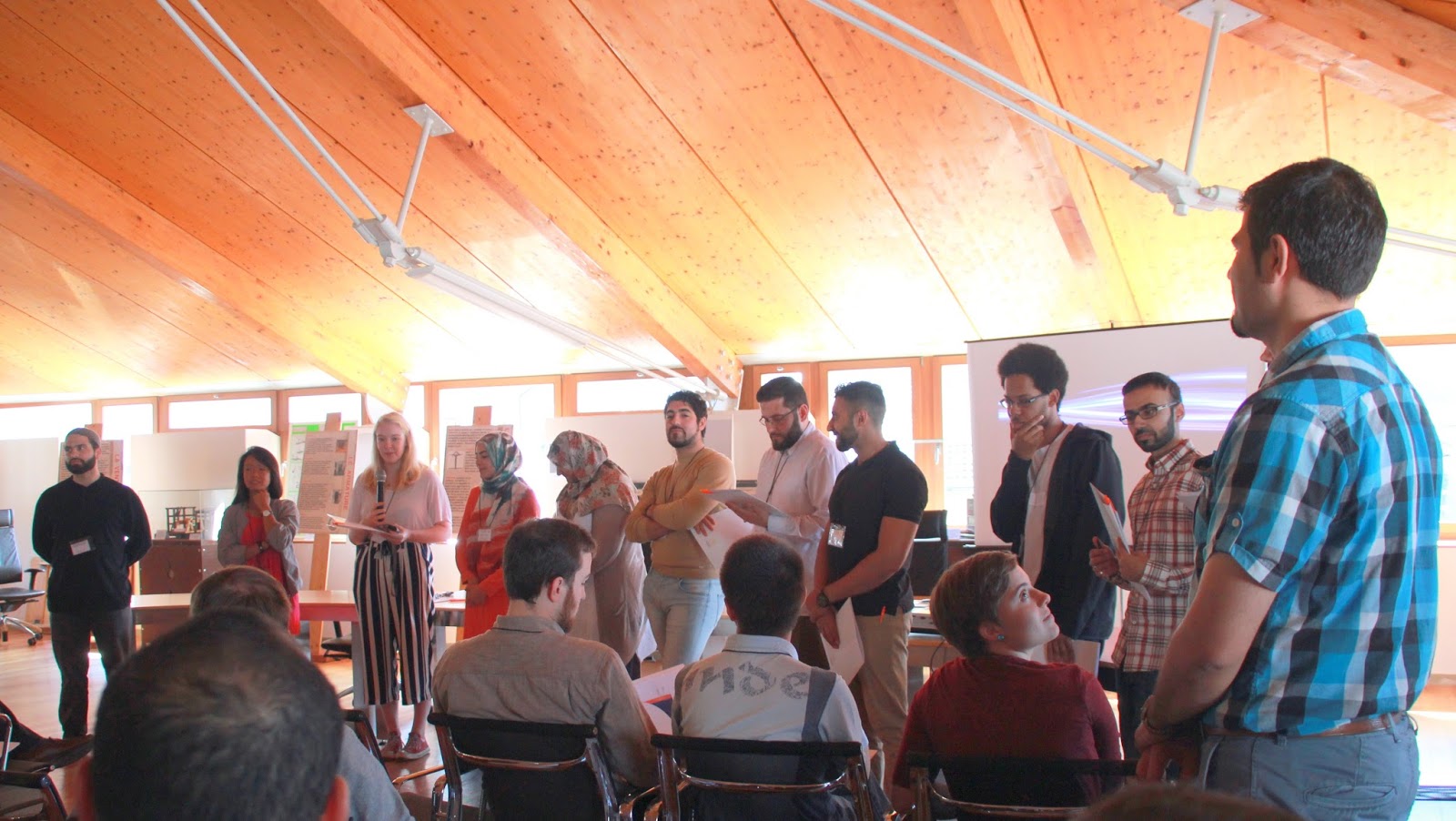 It was in this context that a bond with the Sophia University Institute was established, especially between the Rector, Mons. Piero Coda, and Professor Shomali. With subsequent encounters and lessons offered by the professor to the students of the Institute and the inhabitants of Loppiano, and in collaboration with Rita Moussalem and Roberto Catalano, Co-Directors of the Focolare’s Centre for Interreligious Dialogue, Coda and Shomali had developed the idea of creating a common academic research project with concrete works, which was named Wings of Unity. The core of this initiative is based on the quest for unity of God and unity in God and aims to focus on the perception of God in the two traditions, and in this light, on the possibility of building a true spirit of brotherhood. The finality is to create occasions for reflection in communion between Shiite Muslims and Christians and favouring the education of young generations in interreligious dialogue. As Prof. Shomali himself summarised, in these years they have gone beyond dialogue, and have attained the same way of thinking.
It was in this context that a bond with the Sophia University Institute was established, especially between the Rector, Mons. Piero Coda, and Professor Shomali. With subsequent encounters and lessons offered by the professor to the students of the Institute and the inhabitants of Loppiano, and in collaboration with Rita Moussalem and Roberto Catalano, Co-Directors of the Focolare’s Centre for Interreligious Dialogue, Coda and Shomali had developed the idea of creating a common academic research project with concrete works, which was named Wings of Unity. The core of this initiative is based on the quest for unity of God and unity in God and aims to focus on the perception of God in the two traditions, and in this light, on the possibility of building a true spirit of brotherhood. The finality is to create occasions for reflection in communion between Shiite Muslims and Christians and favouring the education of young generations in interreligious dialogue. As Prof. Shomali himself summarised, in these years they have gone beyond dialogue, and have attained the same way of thinking.

 Thousands of young people are preparing for the Genfest by seizing opportunities to promote universal brotherhood across the globe. Not as noisy as the wars and bombings, less worth it for the crime channels, but factual and quite effective when it comes to building a world without barbed wire borders, hatred and indifference. It’s the MILONGA Project, not a place for dancing the tango, but an international volunteer programme that does have some similarities with the Latin American dance style known as tango: with its fast pace, its warmth and generous spirit. This communication network connects thousands of social projects around the world. It’s known as the MILONGA Project. MILONGA is an acronym formed by the Italian words for: a thousand non-governmental organizations in action (www.milongaproject.org) that are all inspired by the Focolare’s charism of unity. The young men and women who belong to the project not only volunteer, but also expand their hearts as they open themselves to the rich cultures of other countries. Promoted by the International New Humanity Association and by Youth for a United world, the MILONGA Project went through a pilot phase in Latin America (Argentina, Bolivia, Brazil, Mexico, Paraguay, Venezuela and Uruguay). Now, it is also active in Italy, Croatia Jordan, Philippines, Kenya and Tanzania.
Thousands of young people are preparing for the Genfest by seizing opportunities to promote universal brotherhood across the globe. Not as noisy as the wars and bombings, less worth it for the crime channels, but factual and quite effective when it comes to building a world without barbed wire borders, hatred and indifference. It’s the MILONGA Project, not a place for dancing the tango, but an international volunteer programme that does have some similarities with the Latin American dance style known as tango: with its fast pace, its warmth and generous spirit. This communication network connects thousands of social projects around the world. It’s known as the MILONGA Project. MILONGA is an acronym formed by the Italian words for: a thousand non-governmental organizations in action (www.milongaproject.org) that are all inspired by the Focolare’s charism of unity. The young men and women who belong to the project not only volunteer, but also expand their hearts as they open themselves to the rich cultures of other countries. Promoted by the International New Humanity Association and by Youth for a United world, the MILONGA Project went through a pilot phase in Latin America (Argentina, Bolivia, Brazil, Mexico, Paraguay, Venezuela and Uruguay). Now, it is also active in Italy, Croatia Jordan, Philippines, Kenya and Tanzania.  On August 5th, representatives from the Focolare’s permanent Mariapolises around the world, and representatives from various NGOs, met for one week at the Mariapolis in Brazil to discuss strategies for further network development, examining strategic and management aspects of the program, selection and accompaniment, monitoring and reception of participants into the project; and also to offer a quality formation process that will have a positive impact on both the individual volunteers and on the host communities. Sixty young people who participated in the pilot projects will now have the opportunity to fulfil their dream of volunteering beyond their own borders. MILONGA provides training in preparation for the arrival in the host country, with an indvidualized training program for each volunteer, as well as for the host entity in the other country. It provides a trainer that accompanies the young person through every phase of the experience – training, stay and return to one’s own country. It also ensures that the young person will be welcomed by the local Mariapolis and Focolare community and have a direct experience of the local environment. Each participant has an opportunity to interact with peers on an international level by linking up with the United World Project.
On August 5th, representatives from the Focolare’s permanent Mariapolises around the world, and representatives from various NGOs, met for one week at the Mariapolis in Brazil to discuss strategies for further network development, examining strategic and management aspects of the program, selection and accompaniment, monitoring and reception of participants into the project; and also to offer a quality formation process that will have a positive impact on both the individual volunteers and on the host communities. Sixty young people who participated in the pilot projects will now have the opportunity to fulfil their dream of volunteering beyond their own borders. MILONGA provides training in preparation for the arrival in the host country, with an indvidualized training program for each volunteer, as well as for the host entity in the other country. It provides a trainer that accompanies the young person through every phase of the experience – training, stay and return to one’s own country. It also ensures that the young person will be welcomed by the local Mariapolis and Focolare community and have a direct experience of the local environment. Each participant has an opportunity to interact with peers on an international level by linking up with the United World Project.  MILONGA’s method emerges from an experience that has matured over years, and from the impact that the volunteer experience is having in a variety of settings. It is a rather unique style of social action, in which the fraternal bond among the different actors is the main key. Fraternity is also the key in motivating the encounter of the different communities in vulnerable situations, to bring about an experience of communion with the volunteers, and experience of dialogue and real intercultural exchange, in order to discover together solutions that do not come from above, but are as much as possible shared in a reciprocal way. “It’s not so easy to put into a few words what I experienced for a month at the Casa de los Niños (Children’s Home) in Cochabamba,” says an Uruguayan volunteer at an NGO in Bolivia. “After New Year’s I was headed for an adventure that I had been thinking about for some time, saving money and getting my heart ready. I wanted to go with an NGO that had the Focolare spirit, and I was surprised by the brotherhood I experienced throughout every moment.” “I got to know a social reality that is very different from the one we live,” says a young Spanish volunteer, “a very powerful reality that helped me, not so much to be aware of certain problems, because perhaps I already had some knowledge of them, but to recognize and accept the fact that beyond where we come from, how much money we have, where we live – we’re all equal and the same.”
MILONGA’s method emerges from an experience that has matured over years, and from the impact that the volunteer experience is having in a variety of settings. It is a rather unique style of social action, in which the fraternal bond among the different actors is the main key. Fraternity is also the key in motivating the encounter of the different communities in vulnerable situations, to bring about an experience of communion with the volunteers, and experience of dialogue and real intercultural exchange, in order to discover together solutions that do not come from above, but are as much as possible shared in a reciprocal way. “It’s not so easy to put into a few words what I experienced for a month at the Casa de los Niños (Children’s Home) in Cochabamba,” says an Uruguayan volunteer at an NGO in Bolivia. “After New Year’s I was headed for an adventure that I had been thinking about for some time, saving money and getting my heart ready. I wanted to go with an NGO that had the Focolare spirit, and I was surprised by the brotherhood I experienced throughout every moment.” “I got to know a social reality that is very different from the one we live,” says a young Spanish volunteer, “a very powerful reality that helped me, not so much to be aware of certain problems, because perhaps I already had some knowledge of them, but to recognize and accept the fact that beyond where we come from, how much money we have, where we live – we’re all equal and the same.”



 The Park of the Nations in Córdoba,
The Park of the Nations in Córdoba, 
 A summer school in the Primiero Valleys (Italy) is not a novelty. Some had taken place in the past years, thanks to the initiative of the
A summer school in the Primiero Valleys (Italy) is not a novelty. Some had taken place in the past years, thanks to the initiative of the  Besides a profound experience with the Benedictine community of the monastery of Ampleforth, the Shomalis had deepened their knowledge of the spirituality of communion and had also met other Christians and Muslims, on the occasion of international meetings held in Rome and in
Besides a profound experience with the Benedictine community of the monastery of Ampleforth, the Shomalis had deepened their knowledge of the spirituality of communion and had also met other Christians and Muslims, on the occasion of international meetings held in Rome and in  It was in this context that a bond with the Sophia University Institute was established, especially between the Rector, Mons. Piero Coda, and Professor Shomali. With subsequent encounters and lessons offered by the professor to the students of the Institute and the inhabitants of Loppiano, and in collaboration with Rita Moussalem and Roberto Catalano, Co-Directors of the Focolare’s Centre for Interreligious Dialogue, Coda and Shomali had developed the idea of creating a common academic research project with concrete works, which was named Wings of Unity. The core of this initiative is based on the quest for unity of God and unity in God and aims to focus on the perception of God in the two traditions, and in this light, on the possibility of building a true spirit of brotherhood. The finality is to create occasions for reflection in communion between Shiite Muslims and Christians and favouring the education of young generations in interreligious dialogue. As Prof. Shomali himself summarised, in these years they have gone beyond dialogue, and have attained the same way of thinking.
It was in this context that a bond with the Sophia University Institute was established, especially between the Rector, Mons. Piero Coda, and Professor Shomali. With subsequent encounters and lessons offered by the professor to the students of the Institute and the inhabitants of Loppiano, and in collaboration with Rita Moussalem and Roberto Catalano, Co-Directors of the Focolare’s Centre for Interreligious Dialogue, Coda and Shomali had developed the idea of creating a common academic research project with concrete works, which was named Wings of Unity. The core of this initiative is based on the quest for unity of God and unity in God and aims to focus on the perception of God in the two traditions, and in this light, on the possibility of building a true spirit of brotherhood. The finality is to create occasions for reflection in communion between Shiite Muslims and Christians and favouring the education of young generations in interreligious dialogue. As Prof. Shomali himself summarised, in these years they have gone beyond dialogue, and have attained the same way of thinking.